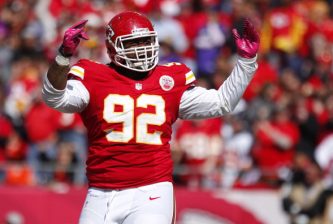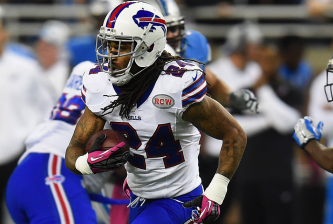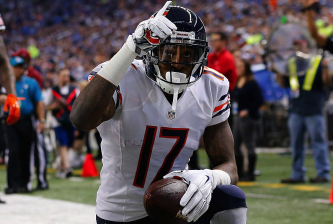Professional football lost an icon today with the death of Al Davis at age 82. NFL commissioner Roger Goodell released this statement upon the news of Davis’ death:
“Al Davis’s passion for football and his influence on the game were extraordinary. He defined the Raiders and contributed to pro football at every level. The respect he commanded was evident in the way that people listened carefully every time he spoke. He is a true legend of the game whose impact and legacy will forever be part of the NFL.”
For those of us that remember Davis as the man yielding the iron fist over the Raiders, often drafting he who runs the fastest, there was much, much more to the man.
Davis’ influence over modern football is so deeply ingrained that fans under age 40 are not aware of how much Davis’ recent image as a curmudgeon clashed with his innovative contributions to the game. Davis was an early proponent of the downfield offense. He called it the “vertical offense” after adopting concepts of Don Coryell’s passing ideas while coaching at the Los Angeles/San Diego Chargers in the early 1960s. Coryell was then head coach of San Diego State University. Davis brought the ideas to the Raiders when he was named head coach and general manager at age 33 in 1963. The Raiders improved to 10-4 from 1-13 in Davis’ first year and he was named AFL Coach of the Year.
He was one of the most, if not the most, influential members in the creation of the modern day NFL. The American Football League struggled to compete on equal footing with the NFL establishment and imposed on the aggressive Davis to serve as commissioner in 1966. Davis intended to push the AFL’s strategy of competing for marquee players drafted by the NFL. However, unknown to Davis, Lamar Hunt and Tex Schramm engaged in secret negotiations that led to the AFL-NFL merger to end the player bidding war that the AFL hired Davis to wage.
Davis, typically for him, was not the biggest fan of the merger, so he rescinded his role as commissioner four years before the AFL came to an end. He had fully expected to build the AFL into the superior football league. Davis then bought a 10% stake in the Raiders, and joined Wayne Valley and Ed McGah as co-owners. As the head of football operations as well, Davis had free reign to run the team how he wanted in the early days of the league.
He extended his ideas for the vertical offense at a time with power running and power defense was the NFL rage of the day. Davis signed John Madden, a Coryell disciple, as coach in 1969 and the Raiders legacy was forever set.
Though Davis is considered a founding member of the modern NFL, he never considered himself a member of its establishment. He frequently clashed with the league and was not popular among owners. Davis was surely not one to ever why away from controversy. When managing parter Valley was at the ’72 Olympics, Davis went behind his back and drafted a new ownership agreement that gave him almost complete control over the operations of the team. He ran the team like it was his own until then, despite not acquiring majority stake in the team until ’05.
When the NFL attempted to stop Davis from moving the Raiders from Oakland to Los Angeles, Davis sued the league and won on antitrust grounds. Nothing offends fans more than moving a franchise. Davis left a gaping wound in Oakland from 1982 until the team moved back for the 1995 season.
The NFL was unable to prevent later franchise moves by the Cleveland Browns and Baltimore Colts. Its tactic now is to work with prospective ownership groups as they are doing in Los Angeles. Public and private interests are moving towards constructing a new football stadium. As many as five NFL franchises, including the Raiders, are thought to be candidates to move there.
What many younger generations will remember Davis for is his penchant for making questionable draft picks. This was only possible in the first place due to the fact that he did not have an official general manager, and instead ran the team himself.
Darrius Heyward-Bey, Robert Gallery, Michael Huff and of course JaMarcus Russell. Those are just some of the first round picks that Davis had his hands on in the past decade, and very little remains.
Davis became a caricature of himself in recent seasons for clinging to concepts that seems outdated and for notable conflicts with his coaches, including Mike Shanahan, Jon Gruden and Lane Kiffin. The Raiders on field performance suffered and Davis became a laughingstock.
But somehow Davis had a late-life change in philosophy, or had someone else in his ear in the past few years, as the Raiders have suddenly put together a respectable team.
Instead of taking receivers with first round picks, he started taking them later. Louis Murphy, Denarius Moore and Jacoby Ford are all having a significant impact on the team, arguably equal to that of former 7th overall pick Heyward-Bey. He drafted a linebackers and a center with his first pick in the past two years, rather than using it on a skill position.
The team is undergoing a revival, ironically with a power-running game on the legs of Darren McFadden. Oakland’s offense is guided by offensive coordinator and Coryell disciple Al Saunders who still coaches the downfield offense.
But where do the Raiders go from here? The succession plan was such that his son Marc Davis was supposed to take over the team. He was seen around the Raiders facility in the past few years, but what his intentions are for the team remain unclear.
Al had various legal battles with the league relating to the team, including his assertion that no team should be in Los Angeles, despite Oakland not exactly being a stones throw from LA. So what will Marc do with the team now? Will they move to LA? Will they move to Toronto? It is impossible to say at this point with so little known about the successor.
For those of you that remember Davis as an old man drafting players based on their 40 times, and running a coaching carousel through Oakland, do some reading about how he made the league what it is today. He was the first one that realized that Lane Kiffin was maybe not all there, so he might have known a thing or two that we didn’t. He also hired the leagues first black coach, the first Latino coach and the first female executive.
Al, you will be missed. Just win, baby, wherever you are.




